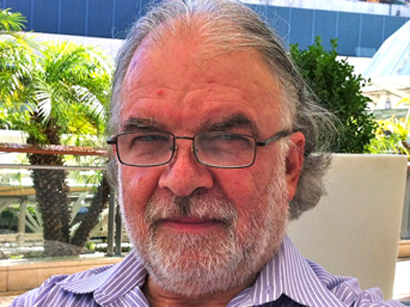By Claude Salhani - Trend:
The crisis in Ukraine is turning into a potential disaster- bringing the West and Russia -- yesterday's Cold War warriors - face-to-face - in a new heated game of chicken.
There is little doubt as to who is likely to blink first and "chicken out," as the West, still reeling from two protracted wars (in Iraq and Afghanistan) are unlikely to jump head first into a new quagmire. They are still trying to extract themselves from those last two unromantic misadventures.
And Russia knows that very well and is even counting on it. Russian President Vladimir Putin is betting on the odds that the West will be reluctant to send their young men and young women to die to save Crimea for Ukraine.
But what the Russian president has possibly overlooked is the Ronald Reagan example, using the economy as political weapon. Putin is well placed to remember that two line items in the West's budget ultimately brought down the Soviet Union: the Star War Initiative, with which the communist budget could not keep up; and the CIA's sabotage of the Trans-Siberian Pipeline.
Already the crisis in the Crimea has forced the price of Russian oil up $2 a barrel as of Monday creating havoc on some energy markets. And the Russian ruble is losing value to the U.S. dollar, giving less value to the Russian currency on the international exchanges. This means that Russians will have to start paying more for less.
The uncertainty prevailing in Ukraine and subsequently the uncertainty reflected in the Crimea, a strategic peninsula situated at the southern tip of the country, could send oil prices soaring upwards more and more if that momentum continues to build.
Over this past weekend Russia's parliament approved President Vladimir Putin's request to send Russian troops to Crimea, a region that was part of Russia for the good part of 200 years. The territory was returned to Ukraine in 1954 by then Soviet leader Nikita Krushchev.
However, the region remains heavily populated by Russians, providing Moscow with a good reason to intervene in order to protect the people from what Moscow describes as neo-Nazis. In the U.S. the government waves the terrorist threat to justify its military interventions in foreign lands, the Russians meanwhile have their own version that raises as much fear as jihadi terrorists do in the West. Memories of Ukrainian collaboration with Nazi Germany have still not faded away.
Some Russian troops have already taken up positions around a number of strategic locations in Crimea, meanwhile in the capital, Kiev, a number of Western leaders, including the British Foreign Secretary William Hague and the U.S. Secretary of State John Kerry flew in to the Ukrainian capital Monday to reassure Kiev of their support.
Ukrainians, on their own, could never stop a Russian incursion, in the event that Moscow opts to do so. The Ukrainian military is of course nowhere nearly as armed, manned and combat experienced as the Russians. Judge for yourself:
Russia Ukraine
Active military personnel: 766,000 / 160,000
Combat planes: 3,082 / 400
Helicopters: 973 / 93
Tanks: 15,500 / 4,112.
Ships: 352 / 25
As a matter of fact Russia's Black Sea fleet is based in Sevastopol, in Crimea, a port of vital importance to Moscow.
If history truly repeats itself, what may lie ahead is not very encouraging.
The Crimean War of 1853-1856 was a war that began not out of any great pre-planning or strategic reasoning but more due to the incompetence of the concerned leadership of the time. There are good chances that history is about to repeat itself.
Westerners may romanticize about it through the poem written by Alfred Lord Tennyson, depicting the Charge of the Light Brigade. But to Russians the war in Crimea is better known as the Eastern War, and is a reminder of the importance that this former Russian territory remains a region close to Moscow's heart.
The war transformed much of the region. As the battlefields shifted and troops moved accordingly. Large numbers of people were forced to move simply to avoid getting caught in the crossfire. Others were frightened away by nationalist movements who were incited by the war, the present-day states of Ukraine, Moldova, Bulgaria, Romania, Greece, Turkey, Armenia, Georgia, and regions such as Crimea and the Caucasus all changed significantly due to this conflict.
Hopefully, in today's conflict a peaceful solution may be found.
Claude Salhani is senior editor at Trend Agency in Baku and a political analyst specializing in the Middle East, Central Asia and terrorism. You can follow him in Twitter @claudesalhani.






